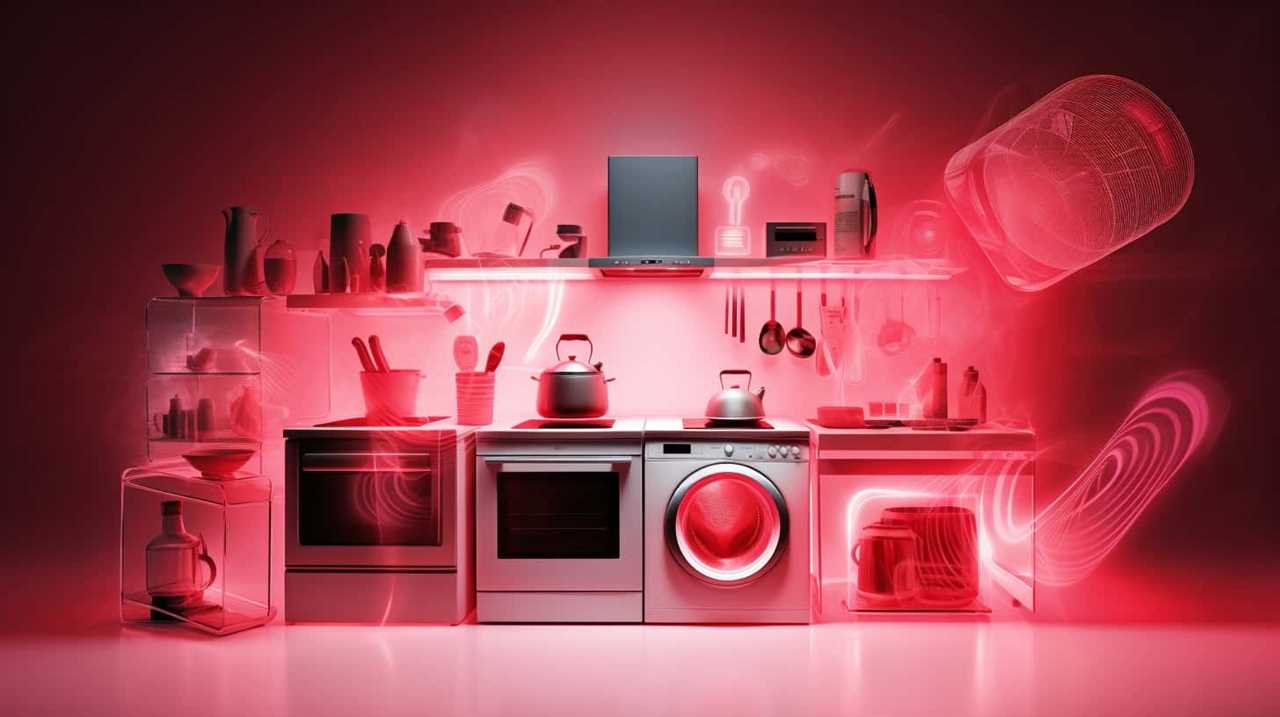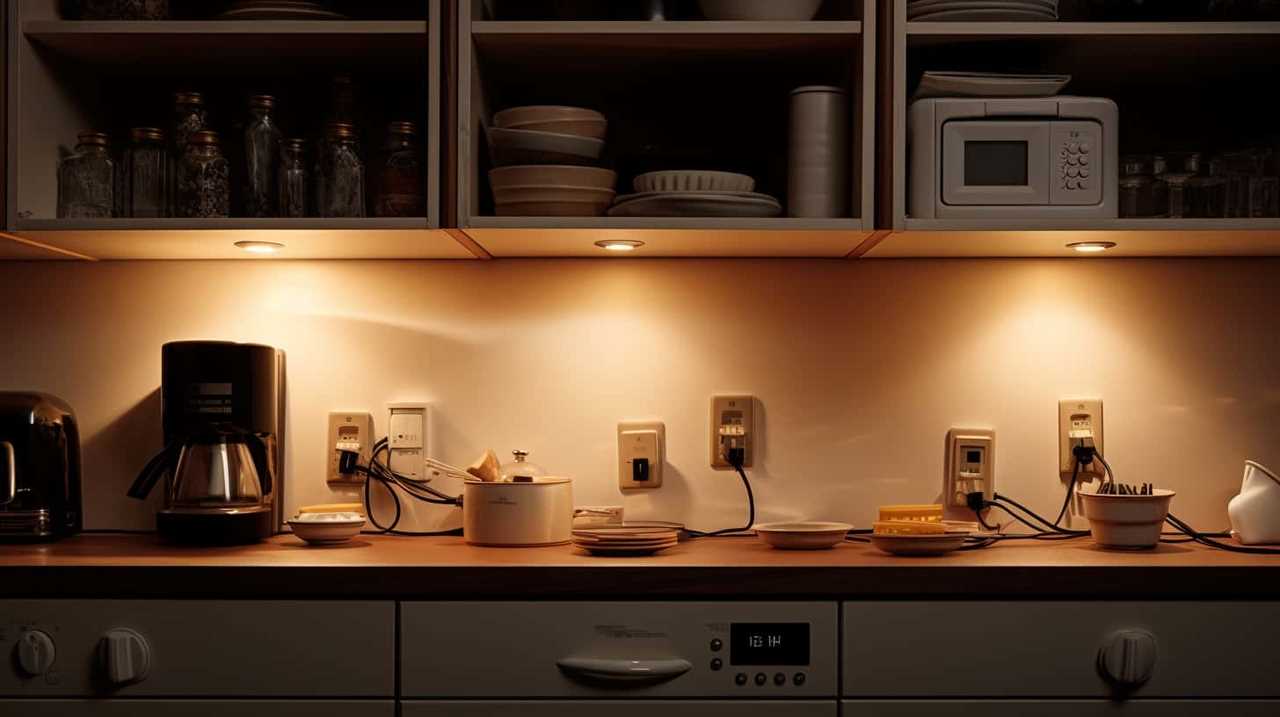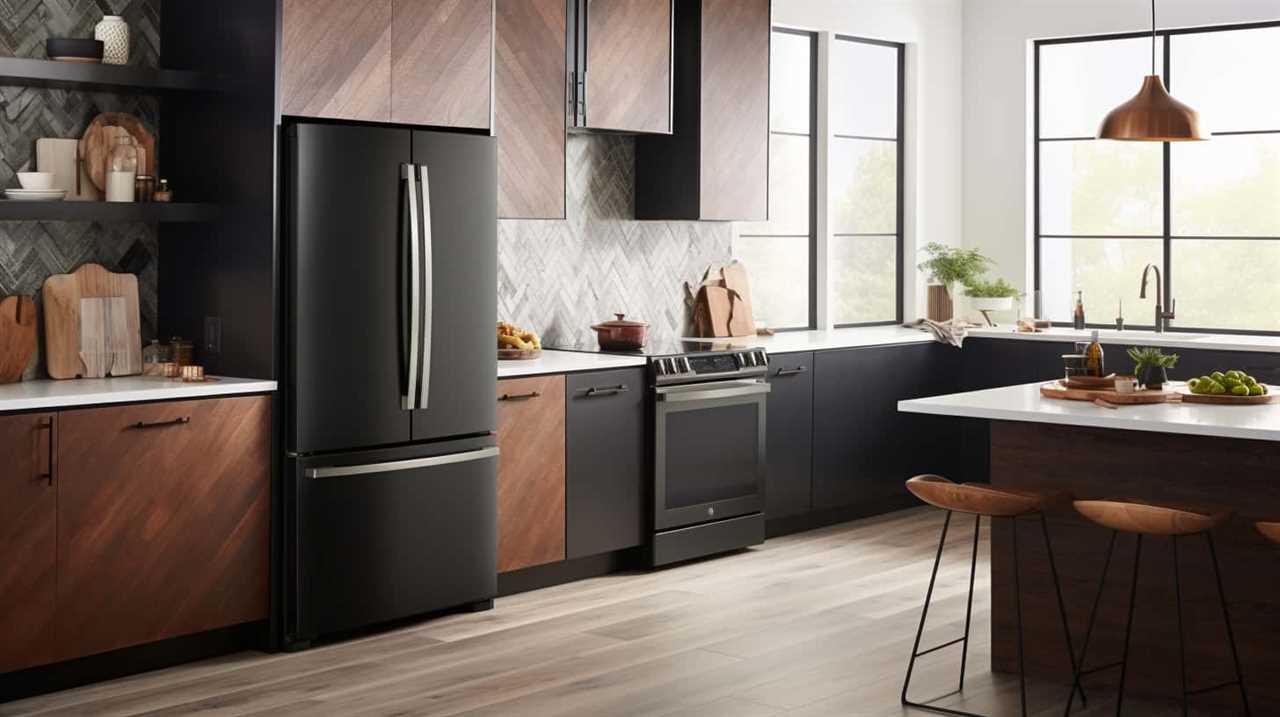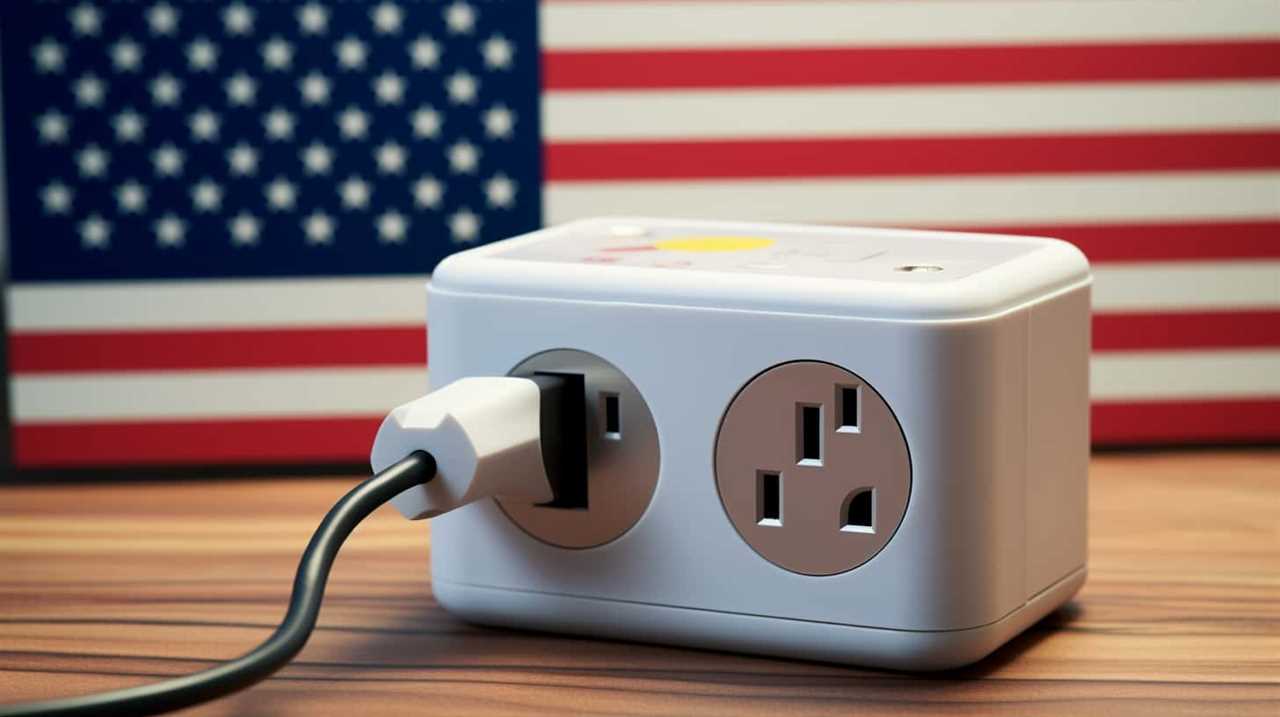We understand that gas is essential for our modern households. It is used to fuel our heating systems, operate cooking appliances, and heat our water.
But did you know it also ignites our clothes dryers, fireplaces, and outdoor grills? Yes, gas is the unsung hero that keeps our households running smoothly.
In this article, we’ll explore the various appliances in our homes that rely on gas, giving you a comprehensive understanding of the power behind these everyday essentials.
Get ready to master the world of gas-powered appliances!

Key Takeaways
- Gas furnaces and fireplaces are efficient central heating systems that distribute warm air throughout the house using ductwork.
- Gas stoves offer instant heat and precise temperature control for faster and more efficient cooking.
- Gas water heaters provide hot water for daily needs such as showering, washing dishes, and doing laundry.
- Gas dryers have faster drying times and lower energy consumption compared to electric dryers.
Heating Appliances
We use gas for heating appliances in our house. Two common types of heating appliances that utilize gas are gas furnaces and gas fireplaces.
Gas furnaces are a central heating system that heats the air and distributes it throughout the house using ductwork. They’re highly efficient and provide consistent warmth during the colder months.
Gas fireplaces, on the other hand, are a great option for adding warmth and ambiance to a room. They use gas to produce flames and heat, creating a cozy atmosphere without the hassle of wood burning.
Both gas furnaces and gas fireplaces are reliable and convenient sources of heat in our homes. It’s important to ensure they’re properly maintained and serviced to ensure optimal performance and safety.

Cooking Appliances
When it comes to cooking appliances, gas stoves offer a range of benefits. They provide instant heat and precise temperature control, allowing for faster and more efficient cooking. Gas stoves also offer a more even heat distribution, resulting in better cooking results.
In comparison, electric stoves can take longer to heat up and cool down, and they may not offer the same level of control.
Benefits of Gas Cooking
Gas cooking offers numerous benefits to homeowners and is preferred by many for its efficient and precise cooking capabilities.
One of the main advantages of gas cooking appliances is their instant heat. Gas burners provide immediate and consistent heat, allowing for quicker cooking times and better control over temperature adjustments.

Additionally, gas stoves and ovens offer more precise temperature control compared to electric alternatives. This precision allows for better cooking results, especially when it comes to delicate dishes that require precise heat adjustments.
Gas cooking appliances are also known for their responsiveness. When the heat is turned off, the flame immediately goes out, providing instant cooling. This feature helps prevent overcooking and allows for safer cooking experiences.
Gas Vs. Electric Stoves
Moving on to the topic of cooking appliances, let’s compare gas and electric stoves and see how they stack up against each other.
Here are some advantages of gas stoves over electric ovens:

- Instant heat: Gas stoves provide immediate and precise heat control, allowing for faster cooking and better results.
- Even heat distribution: Gas burners distribute heat evenly across pots and pans, ensuring consistent cooking.
- Versatility: Gas stoves offer a wider range of heat options, from high flames for boiling to low flames for simmering.
- Reliability: Gas stoves continue to work during power outages, making them a reliable cooking option.
In contrast, electric stoves have their own advantages, such as easier cleaning and lower installation costs. However, for those seeking mastery in cooking, gas stoves offer superior control and performance.
Now, let’s move on to the next topic: water heating systems.
Water Heating Systems
Our water heating system is an essential appliance in our house that runs on gas. It provides hot water for our daily needs, such as showering, washing dishes, and doing laundry. When it comes to water heating efficiency, there are different types of water heaters available. Let’s take a look at the table below for an overview of the most common types:
| Type of Water Heater | Efficiency | Pros | Cons |
|---|---|---|---|
| Storage Tank | Medium | – Affordable |
- Easy installation | – Limited hot water supply
- Energy loss from standby heat |
| Tankless | High | – Continuous hot water - Energy savings | – Higher upfront cost
- Might require larger gas line |
| Heat Pump | High | – Energy-efficient - Low operating cost | – Higher upfront cost
- Requires suitable location for installation |
| Solar | High | – Environmentally friendly - Long-term cost savings | – Higher upfront cost
- Limited efficiency in cloudy climates |
Understanding the different types of water heaters can help you make an informed decision based on your needs and priorities, ensuring efficient and reliable hot water supply in your home.

Clothes Dryers
Let’s talk about gas and electric dryers and compare their energy efficiency.
Gas dryers are known for their faster drying times and lower energy consumption compared to electric dryers. They use natural gas or propane to generate heat, which is more efficient than electric heating elements.
Understanding the differences between gas and electric dryers can help homeowners make informed decisions about their laundry appliances.
Gas Vs. Electric Dryers
Comparing gas and electric dryers is essential when considering which option is best for our household. Here are four key points to consider:

- Cost:
- Gas dryers tend to have a higher upfront cost, but they’re generally more energy-efficient and can save money in the long run.
- Electric dryers have a lower upfront cost, but they may result in higher electricity bills.
- Performance:
- Gas dryers typically heat up faster and dry clothes more quickly than electric dryers.
- They also produce less static cling and wrinkles, leaving clothes looking and feeling better.
- Installation:
- Gas dryers require a gas line and proper ventilation, which can add to the installation cost.
- Electric dryers only require a dedicated electrical outlet.
- Compatibility:
- If your home already has a gas line for appliances like gas ovens or water heaters, choosing a gas dryer may be more convenient and cost-effective.
Considering these factors will help us make an informed decision about whether a gas or electric dryer is the right choice for our household.
Now, let’s move on to the next section and compare their energy efficiency.
Energy Efficiency Comparison
Now, we’ll delve into the energy efficiency comparison of gas and electric dryers.
When considering energy savings and environmental impact, gas dryers tend to be more efficient than electric dryers. Gas dryers use natural gas as their heat source, which is typically cheaper and more environmentally friendly than electricity generated from burning fossil fuels.

Gas dryers also heat up faster and dry clothes more quickly, resulting in shorter drying times and less energy consumption overall.
On the other hand, electric dryers require a significant amount of energy to generate heat, which can be costly and have a larger environmental footprint.
Therefore, if energy savings and reducing environmental impact are a concern, opting for a gas dryer may be the more efficient choice.
Fireplaces and Stoves
Which gas appliances in our house include fireplaces and stoves?

Fireplaces and stoves are popular gas appliances that can enhance the ambiance and functionality of our homes. Here are four key reasons why gas fireplaces and stoves are a great addition:
- Efficiency: Gas fireplaces and stoves provide efficient heat, allowing us to warm our living spaces quickly and effectively.
- Convenience: With just a flip of a switch, we can easily ignite and control the flames, eliminating the need for gathering and storing firewood.
- Cleanliness: Gas fireplaces and stoves produce minimal smoke and ash, reducing the maintenance and cleaning required compared to traditional wood-burning options.
- Safety: Gas fireplaces and stoves eliminate the risk of sparks, embers, and chimney fires associated with traditional fireplaces, ensuring a safer environment for our homes.
Outdoor Grills and BBQs
One appliance in our house that uses gas is the outdoor grill and BBQ. Outdoor cooking has become increasingly popular, and gas grills provide a convenient and efficient way to cook delicious meals outdoors.
Gas grilling techniques offer precise temperature control, allowing for even and consistent cooking. With a gas grill, you can easily adjust the heat and quickly achieve the desired temperature, whether you’re searing a steak or slow-cooking ribs.
Gas grills also heat up faster than charcoal grills, saving you time and getting you grilling sooner. They’re easy to ignite and maintain, making them a preferred choice for outdoor cooking enthusiasts.

Now, let’s move on to the next topic: backup generators.
Backup Generators
Moving on from outdoor grills and BBQs, another appliance in our house that utilizes gas is backup generators. These devices provide an essential power source during emergencies, ensuring that we can continue to run our essential appliances and maintain a comfortable living environment. Here are some key points to consider about backup generators:
- Installation: Backup generator installation should be done by a professional to ensure proper set up and safe operation.
- Maintenance and Costs: Regular maintenance is crucial to keep the generator in good working condition. This includes oil changes, filter replacements, and battery checks. It’s also important to factor in the cost of fuel and any necessary repairs.
- Pros of using a backup generator: They provide peace of mind during power outages, keeping essential systems running and preserving food in the refrigerator. They can also increase the value of your home.
- Cons of using a backup generator: They require fuel, which can be expensive and may not be readily available during certain situations. They can also be noisy and emit exhaust fumes.
When considering a backup generator, it’s important to weigh these factors against your specific needs and circumstances.
Frequently Asked Questions
Are Gas Appliances More Energy-Efficient Compared to Electric Ones?
Gas appliances are generally more energy-efficient than electric ones, as they have lower energy consumption and produce fewer greenhouse gas emissions. This makes them a more environmentally friendly option for households concerned about energy efficiency and sustainability.

Can Gas Appliances Be Converted to Use Electricity?
Converting gas appliances to use electricity? Let’s explore the benefits of electric appliances. They offer efficiency, reliability, and environmental friendliness. Making the switch can transform your home into a modern, sustainable haven.
What Safety Measures Should Be Taken When Using Gas Appliances?
When using gas appliances, it is crucial to prioritize safety. Proper gas appliance maintenance and installation are essential to prevent accidents or leaks. We must be knowledgeable and responsible in ensuring a safe environment.
How Often Should Gas Appliances Be Serviced and Maintained?
Gas appliance maintenance is crucial for safety and efficiency. Regular servicing prevents common issues like leaks and malfunctions. We recommend scheduling maintenance annually to ensure your appliances are running smoothly and to avoid any potential hazards.
Are Gas Appliances More Expensive to Purchase and Install Compared to Electric Appliances?
Gas appliances are more cost effective in the long run compared to electric ones. They may have a higher upfront cost, but lower operating costs. The environmental impacts of gas appliances are generally lower than electric ones.

Conclusion
In conclusion, gas appliances are an essential part of our homes, providing warmth, comfort, and convenience.
From heating appliances to cooking appliances, water heating systems to clothes dryers, fireplaces and stoves to outdoor grills and BBQs, and even backup generators, gas-powered devices make our lives easier.
They ignite a flame of efficiency and reliability, ensuring that our household tasks are completed with ease.
So, let the warmth of gas appliances fill your home, creating a cozy and inviting atmosphere.










